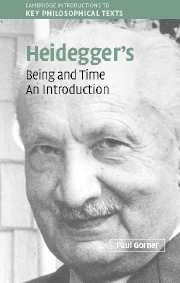7 - Authenticity
Published online by Cambridge University Press: 05 June 2012
Summary
Heidegger's phenomenology of Dasein, his existential analytic, is the laying bare, or letting be seen, of the fundamental structures of existence – the mode of being peculiar to Dasein. In so far as Dasein is, Dasein exists. But he does not just speak about the structures of existence. He also draws a basic distinction between existing authentically and existing inauthentically. Initially at least, his existential analytic is concerned solely with Dasein in what he calls its ‘everydayness’ (Alltäglichkeit). The structures of being which his phenomenology of Dasein claims to lay bare are, in the first instance, either indifferent to the distinction between authentic (eigentlich) existence and inauthentic (uneigentlich) existence or they are structures of inauthentic existence. So what does this distinction amount to? It first appears in § 4 (though at this stage the terms ‘authentic’ and ‘inauthentic’ are not used): ‘Dasein always understands itself in terms of its existence – in terms of a possibility of itself: to be itself or not itself. Dasein has either chosen these possibilities itself, or got itself into them [in sie hineingeraten], or grown up in them already’ (12). To exist authentically is to be myself, to choose my possibilities of being. The terminology is first used in § 9: ‘And because Dasein is in each case essentially its own possibility this entity can in its being “choose” itself, win itself; it can lose itself or never win itself but only “seem” to.
- Type
- Chapter
- Information
- Heidegger's Being and TimeAn Introduction, pp. 105 - 152Publisher: Cambridge University PressPrint publication year: 2007



